Book
ISBN: 0691063621 9780691063621 Year: 1978 Publisher: Princeton Princeton university press
Abstract | Keywords | Export | Availability | Bookmark
 Loading...
Loading...Choose an application
- Reference Manager
- EndNote
- RefWorks (Direct export to RefWorks)
Japanese fiction --- Japanese literature --- History and criticism --- History and criticism. --- J5500.70 --- J5930 --- J5931 --- Japan: Literature -- history and criticism -- modern, Kindai (1850s- ), bakumatsu, Meiji, Taishō --- Japan: Literature -- modern fiction and prose (1868- ) --- Japan: Literature -- modern fiction and prose (1868- ) -- criticism --- Japanese fiction - 1868- - History and criticism --- Japanese literature - History and criticism
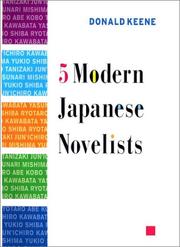
ISBN: 1281869031 9786613792280 0231507496 9780231507493 0231126107 9780231126106 0231126115 9780231126113 9781281869036 6613792284 Year: 2003 Publisher: New York Columbia University Press
Abstract | Keywords | Export | Availability | Bookmark
 Loading...
Loading...Choose an application
- Reference Manager
- EndNote
- RefWorks (Direct export to RefWorks)
A superb introduction to modern Japanese fiction as well as a memoir of his own love affair with Japanese literature and culture, this volume consists of chapters on five modern Japanese novelists whom Donald Keene knew personally: Yasunari Kawabata, Yukio Mishima, Jun'ichiro Tanizaki, Ryotaro Shiba, and Kobo Abe. Each chapter opens with a vignette describing Keene's personal encounters with these famous men, blending his autobiographical observations with literary and cultural analysis.
Japanese fiction --- Authors, Japanese --- History and criticism. --- J2284.70 --- J5500.70 --- J5931 --- History and criticism --- Japan: Genealogy and biography -- biographies -- kindai (1850s- ), bakumatsu, meiji, taishō --- Japan: Literature -- history and criticism -- modern, Kindai (1850s- ), bakumatsu, Meiji, Taishō --- Japan: Literature -- modern fiction and prose (1868- ) -- criticism --- Japanese fiction - 20th century - History and criticism --- Authors, Japanese - 20th century
Book
ISBN: 0231542232 9780231542234 9780231179720 0231179723 Year: 2016 Publisher: New York
Abstract | Keywords | Export | Availability | Bookmark
 Loading...
Loading...Choose an application
- Reference Manager
- EndNote
- RefWorks (Direct export to RefWorks)
Many books in Japanese have been devoted to the poet and critic Ishikawa Takuboku (1886-1912). Although he died at the age of twenty-six and wrote many of his best-known poems in the space of a few years, his name is familiar to every literate Japanese. Takuboku's early death added to the sad romance of the unhappy poet, but there has been no satisfactory biography of his life or career, even in Japanese, and only a small part of his writings have been translated. His mature poetry was based on the work of no predecessor, and he left no disciples. Takuboku stands unique.Takuboku's most popular poems, especially those with a humorous overlay, are often read and memorized, but his diaries and letters, though less familiar, contain rich and vivid glimpses of the poet's thoughts and experiences. They reflect the outlook of an unconstrained man who at times behaved in a startling or even shocking manner. Despite his misdemeanors, Takuboku is regarded as a national poet, all but a saint to his admirers, especially in the regions of Japan where he lived. His refusal to conform to the Japan of the time drove him in striking directions and ranked him as the first poet of the new Japan.
Poets, Japanese --- Ishikawa, Takuboku, --- Ishikawa, Hajime, --- Takuboku, --- Isikava, Takuboku, --- Shih-chʻuan, Zhuo-mu, --- Sichuanzhuomu, --- 石川啄木, --- J5710 --- J5780 --- J5500.70 --- J2284.70 --- Japan: Literature -- poetry -- Waka, tanka, chōka --- Japan: Literature -- poetry -- modern style poetry --- Japan: Literature -- history and criticism -- modern, Kindai (1850s- ), bakumatsu, Meiji, Taishō --- Japan: Genealogy and biography -- biographies -- kindai (1850s- ), bakumatsu, meiji, taishō

ISBN: 0415124581 0415124573 Year: 1996 Volume: *8 Publisher: London New York Routledge
Abstract | Keywords | Export | Availability | Bookmark
 Loading...
Loading...Choose an application
- Reference Manager
- EndNote
- RefWorks (Direct export to RefWorks)
Japanese literature --- Fantastic, The, in literature --- Littérature japonaise --- Fantastique dans la littérature --- History and criticism --- Histoire et critique --- J5930 --- J5500.70 --- J5509 --- J4144 --- Japan: Literature -- modern fiction and prose (1868- ) --- Japan: Literature -- history and criticism -- modern, Kindai (1850s- ), bakumatsu, Meiji, Taishō --- Japan: Literature -- theory, methodology and philosophy --- Japan: Sociology and anthropology -- cultural trends and movements -- modernism --- Littérature japonaise --- Fantastique dans la littérature --- Fantasy literature [Japanese ] --- 20th century
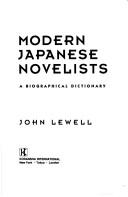
ISBN: 4770016492 Year: 1993 Publisher: New York Kodansha
Abstract | Keywords | Export | Availability | Bookmark
 Loading...
Loading...Choose an application
- Reference Manager
- EndNote
- RefWorks (Direct export to RefWorks)
Japanese fiction --- Authors, Japanese --- Roman japonais --- Ecrivains japonais --- History and criticism --- Translations into English --- Bibliography --- Biography --- Histoire et critique --- Traductions anglaises --- Bibliographie --- Biographies --- J5931 --- J5500.70 --- J5506 --- -Japanese fiction --- -J2250.60 --- Japanese literature --- Japan: Literature -- modern fiction and prose (1868- ) -- criticism --- Japan: Literature -- history and criticism -- modern, Kindai (1850s- ), bakumatsu, Meiji, Taishō --- Japan: Literature -- reference works --- -Bibliography --- Japan: Genealogy and biography -- reference works --- J2280.60 --- Translations into English&delete& --- Bibliography.
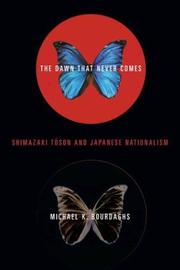
ISBN: 0231129807 1322353115 0231503415 Year: 2003 Publisher: New York : Columbia University Press,
Abstract | Keywords | Export | Availability | Bookmark
 Loading...
Loading...Choose an application
- Reference Manager
- EndNote
- RefWorks (Direct export to RefWorks)
A critical rethinking of theories of national imagination, The Dawn That Never Comes offers the most detailed reading to date in English of one of modern Japan's most influential poets and novelists, Shimazaki Toson (1872-1943). It also reveals how Toson's works influenced the production of a fluid, shifting form of national imagination that has characterized twentieth-century Japan. Analyzing Toson's major works, Michael K. Bourdaghs demonstrates that the construction of national imagination requires a complex interweaving of varied-and sometimes contradictory-figures for imagining the national community. Many scholars have shown, for example, that modern hygiene has functioned in nationalist thought as a method of excluding foreign others as diseased. This study explores the multiple images of illness appearing in Toson's fiction to demonstrate that hygiene employs more than one model of pathology, and it reveals how this multiplicity functioned to produce the combinations of exclusion and assimilation required to sustain a sense of national community. Others have argued that nationalism is inherently ambivalent and self-contradictory; Bourdaghs shows more concretely both how this is so and why it is necessary and provides, in the process, a new way of thinking about national imagination. Individual chapters take up such issues as modern medicine and the discourses of national health; ideologies of the family and its representation in modern literary works; the gendering of the canon of national literature; and the multiple forms of space and time that narratives of national history require.
J5931 --- J5500.70 --- J4122 --- J2284.70 --- Japan: Literature -- modern fiction and prose (1868- ) -- criticism --- Japan: Literature -- history and criticism -- modern, Kindai (1850s- ), bakumatsu, Meiji, Taishō --- Japan: Sociology and anthropology -- nationalism --- Japan: Genealogy and biography -- biographies -- kindai (1850s- ), bakumatsu, meiji, taishō --- Nationalism in literature. --- Shimazaki, Tōson, --- Criticism and interpretation. --- Nationalism in literature --- Shimazaki, Tōson, --- Shimazaki, Haruki, --- Simadzaki-Toson, --- Tōson, --- Simadzaki, Toson, --- Tao-chʻi, Tʻeng-tsʻun, --- 岛崎藤村, --- 島埼藤村, --- 島崎籐村, --- 島崎藤村, --- 島琦藤村,
Book
ISBN: 0295953829 Year: 1975 Publisher: Seattle University of Washington press
Abstract | Keywords | Export | Availability | Bookmark
 Loading...
Loading...Choose an application
- Reference Manager
- EndNote
- RefWorks (Direct export to RefWorks)
J5931 --- J5500.70 --- Japan: Literature -- modern fiction and prose (1868- ) -- criticism --- Japan: Literature -- history and criticism -- modern, Kindai (1850s- ), bakumatsu, Meiji, Taishō --- Tsubouchi, Shoyo --- -Criticism and interpretation --- Realism in literature. --- Tsubouchi, Shōyō, --- Criticism and interpretation. --- Realism in literature --- Neorealism (Literature) --- Magic realism (Literature) --- Mimesis in literature --- Tsubouchi, Shōyō, --- Harunoya Oboro, --- Tsubouchi, Yūzō, --- 坪內肖遥, --- 坪內逍遙, --- 坪內逍遥, --- 坪內雄藏, --- 坪内消遙, --- 坪内逍遙, --- 坪内逍遥, --- 坪内雄藏, --- Tsoubooutchi, Shooyo --- 坪内逍遙 --- Harunoya, Oboro --- 春廼屋朧
Book
ISBN: 0691064008 Year: 1979 Publisher: Princeton Princeton university press
Abstract | Keywords | Export | Availability | Bookmark
 Loading...
Loading...Choose an application
- Reference Manager
- EndNote
- RefWorks (Direct export to RefWorks)
J5930 --- J5500.70 --- Individualism in literature --- Japanese fiction --- -Japanese literature --- Japan: Literature -- modern fiction and prose (1868- ) --- Japan: Literature -- history and criticism -- modern, Kindai (1850s- ), bakumatsu, Meiji, Taishō --- History and criticism --- Individualism in literature. --- History and criticism. --- -Japan: Literature -- modern fiction and prose (1868- ) --- Shimazaki, Tōsōn, --- Shimazaki, Haruki, --- Simadzaki-Toson, --- Tōson, --- Simadzaki, Toson, --- Tao-chʻi, Tʻeng-tsʻun, --- 岛崎藤村, --- 島埼藤村, --- 島崎籐村, --- 島崎藤村, --- 島琦藤村, --- Criticism and interpretation.
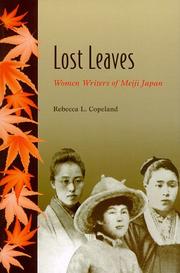
ISBN: 0824822293 0824822919 Year: 2000 Publisher: Honolulu University of Hawaii press
Abstract | Keywords | Export | Availability | Bookmark
 Loading...
Loading...Choose an application
- Reference Manager
- EndNote
- RefWorks (Direct export to RefWorks)
Japanese literature --- Women and literature --- Women authors, Japanese --- Woman authors --- History and criticism. --- J5500.70 --- J5509 --- J5930 --- -Japanese literature --- -Women authors, Japanese --- -Japanese women authors --- Authors, Japanese --- Japan: Literature -- history and criticism -- modern, Kindai (1850s- ), bakumatsu, Meiji, Taishō --- Japan: Literature -- theory, methodology and philosophy --- Japan: Literature -- modern fiction and prose (1868- ) --- history and criticism. --- -History and criticism. --- Meiji period, 1968-1912. --- Littérature japonaise --- History and criticism --- Women authors --- Histoire et critique --- Femmes écrivains --- Woman authors&delete&
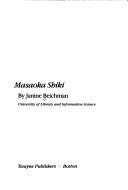
ISBN: 0805765042 080574956X Year: 1982 Publisher: Boston Twayne
Abstract | Keywords | Export | Availability | Bookmark
 Loading...
Loading...Choose an application
- Reference Manager
- EndNote
- RefWorks (Direct export to RefWorks)
J2284.70 --- J5500.70 --- J5710 --- J5730 --- J5931 --- Japan: Genealogy and biography -- biographies -- kindai (1850s- ), bakumatsu, meiji, taishō --- Japan: Literature -- history and criticism -- modern, Kindai (1850s- ), bakumatsu, Meiji, Taishō --- Japan: Literature -- poetry -- Waka, tanka, chōka --- Japan: Literature -- poetry -- haiku, haikai --- Japan: Literature -- modern fiction and prose (1868- ) -- criticism --- Masaoka, Shiki, --- Shiki, --- Dassai Shooku Shujin, --- Upasaka Shiki, --- Cheng-kang, Tzu-kuei, --- Masaokʻa, Sikʻi, --- 正岡子規, --- 正冈子规, --- Criticism and interpretation.

 Search
Search Feedback
Feedback About
About Help
Help News
News